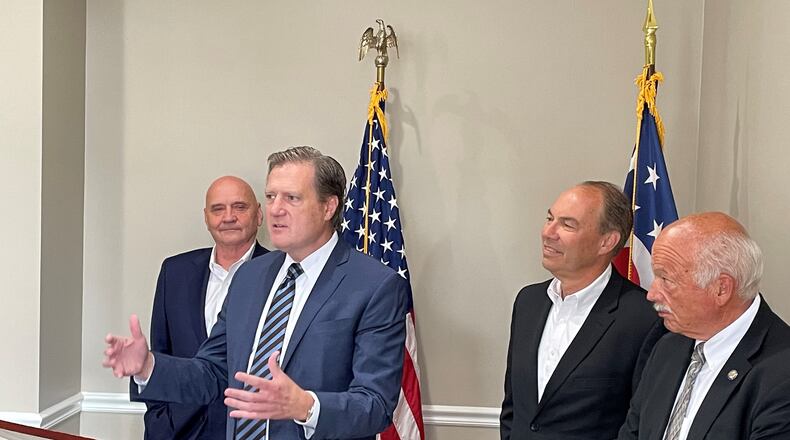Great effort has already gone into developing facilities on the base itself, Turner said. Now the focus is shifting to improving the adjacent communities for the thousands of people whose jobs depend on the base.
Peterson said legislators must ensure the region remains military friendly to attract and retain contractors and functions at the base. He cited such moves as the 2020 authorization for military spouses to temporarily transfer their professional certifications or licenses from other states when their serving spouse is assigned to duty in Ohio.
Hackett said he appreciated Turner’s initiative in creating the Wright-Patterson Regional Council of Governments to coordinate efforts. The counties Hackett represents — Clark, Greene and Madison — are not the area’s largest in population, so they must work together to get things accomplished, he said.
Environmental concerns
Turner also touted his efforts to renew the Brownfields Redevelopment Tax Incentive.
Brownfields are former industrial and commercial sites that are difficult to redevelop due to some level of environmental contamination. The redevelopment tax incentive, created in 1997, allowed taxpayers to deduct environmental cleanup costs if the property would be used for trade, business or producing income. It expired in 2012.
Turner wants the tax incentive to be available for developers to redevelop urban areas, he said. He sought its renewal in 2019, and is trying again this year in collaboration with U.S. Rep. Mikie Sherrill, D-N.J.
Following a series of major water main breaks since 2019, Turner formed a 13-member panel of local leaders to study regional water quality concerns. A report from consulting firm LimnoTech is due this fall.
“Of course, one of those concerns is the ‘forever chemicals’ issue,” Turner said. Forever chemicals are per- and polyfluoroalkyl substances, or PFAS, which have been found in low levels in some local drinking water systems, including Dayton and Wright-Patterson Air Force Base.
Infrastructure spending
Turner and state legislators said they want to monitor spending of federal COVID-19 relief and infrastructure funding to make sure it provides long-term benefits for the area. But they denounced one feature of the $1.2 trillion infrastructure package which the U.S. Senate approved Tuesday in a bipartisan vote. The infrastructure bill now heads to U.S. House.
The infrastructure bill currently includes $125 million for a pilot program testing a by-the-mile tax on drivers to fund road repair and construction.
“That’s a privacy breach beyond anything we can even imagine at this point,” Young said.
Tracking drivers’ mileage raises the specter of privacy invasion and even future travel restrictions, Turner said. Such a tax would have a disproportionate effect on rural drivers who often have much longer commutes than city dwellers, he said.
It’s not clear whether that Vehicle Miles Traveled, or VMT, tax would replace or supplement current gasoline taxes, which are expected to decline as use of electric vehicles grows.
A VMT tax has been discussed for years and some states have experimented with it. Self-reporting of mileage, regular data deletion and third-party data collection have been proposed to deal with privacy concerns.
About the Author

